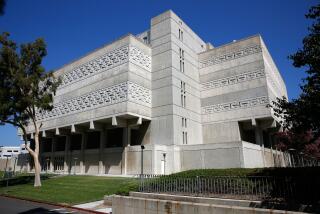U.S. to Drop Arms Case Against Santa Ana Man : Court: The aviation consultant’s prosecution is clouded by the Reagan-era arms-for-hostages scandal and a lack of credibility of two customs agents.
- Share via
LOS ANGELES — Federal prosecutors said Friday that they will seek to dismiss weapons-smuggling charges against a Santa Ana aviation consultant whose prosecution was clouded by a lack of credibility of two customs agents and the arms-for-hostages scandal that embroiled the Reagan Administration.
During a hearing before U.S. District Judge J. Spencer Letts, Assistant U.S. Atty. Baruch Weiss said his office wants to drop the case involving Joseph O’Toole, a retired Air Force colonel accused of trying to sell C-130 military transports to Iran and 712 Stinger surface-to-air missiles to an undisclosed country.
Weiss said his main evidence, tapes of telephone conversations and discussions between O’Toole and undercover investigators, might not be enough proof to convict him.
“The primary reason for the dismissal is that we have seen in the tapes things that can go both ways,” Weiss said. “Some might support guilt, but they might also be subject to reasonable doubt.”
Outside court, Weiss declined to elaborate but said he will file motions to dismiss the case within the next few weeks.
Federal Public Defender H. Dean Steward, O’Toole’s attorney, said the government’s case was fraught with other problems besides the tapes, which dealt with negotiations and arrangements to sell the weapons.
Steward contended that his client, a combat veteran from Vietnam, was a credible defendant; that key documentary evidence had been suppressed, and that two other defendants in the case have already been acquitted.
Ari Ben-Menashe of Israel and Richard St. Francis of Connecticut were acquitted last year during a jury trial in New York City. They were not charged in the sale of the Stingers, a hand-held infantry weapon.
Weiss had alleged that in 1989, the three men violated the Arms Export Control Act, which requires the State Department to approve transfers of U.S.-made military equipment to other countries. The law bars the sale of such materiel to nations, such as Iran, that have supported international terrorism.
Ben-Menashe, O’Toole and St. Francis had been accused of conspiring in 1989 to sell three C-130s for $12 million each to Iran without proper clearance. The cargo planes, which have been workhorses for the U.S. military for decades, were owned by the Israeli government.
O’Toole, 58, who flew more than 100 combat mission during the Vietnam War, was also accused of trying to sell Stinger missiles through Turkey to another country that the government has declined to disclose. He works for FXC Inc., a Santa Ana defense contractor.
From the start, the case has been filled with defense contentions that the military transport sale to Iran had been part of a series of U.S.-approved deals over the years to trade arms for hostages.
During Ben-Menashe’s trial, he testified that he had been an undercover operative for the Israeli government who was supposed to help arrange the sale of the planes to Iran in exchange for three Israeli soldiers captured in Lebanon. St. Francis contended that O’Toole told him that the deal would be sanctioned by the United States.
Later, Ben-Menashe emerged as a figure in the nomination of Robert M. Gates for Central Intelligence Agency director. Among other things, he accused Gates of participating in a purported scheme by Ronald Reagan’s 1980 campaign to delay the release of 52 U.S. hostages then held by Iran until after the November presidential election. The affair also allegedly involved a deal in which weapons would be traded for the hostages.
After reviewing White House records, however, U.S. Senate investigators concluded that Gates never participated in the meetings that Ben-Menashe said he had attended.
The government has also said there is no evidence that Ben-Menashe was an Israeli intelligence operative. Israeli officials only say Ben-Menashe was a lowly translator.
Steward, O’Toole’s attorney, has contended that his client did not violate export-control laws, because he thought he was involved in a deal that was going to be approved by the U.S. government.
Steward said he was prepared to take sworn statements from Ben-Menashe about the purported arms-for-hostages deal in a bid to determine whether the alleged operation had been sanctioned by the Reagan Administration.
Complicating the prosecution further, Judge Letts in July found that two U.S. Customs Service agents, Diane Hanson and Hubert Kostron, had not been truthful about important aspects of their search of O’Toole’s offices at FXC.
Letts concluded that the agents were not credible when they testified that O’Toole had consented to a general search of his workplace. Noting a written consent form, the judge held that O’Toole had given approval to search just one file. Based on that, Letts threw out much of the documentary evidence that was seized.
Weiss asked Letts on Friday to reconsider his finding that the customs agents lacked credibility.
The agents did not lie on the witness stand, said Weiss, who blamed a misunderstanding between O’Toole and the agents for the problem.
Letts denied the motion, saying he is faced with two prospects: “Either a lot of people were inept or they were not telling the truth. In the face of that, I find the agents’ story incredible.
“This kind of thing is becoming endemic, and I am no longer willing to listen to this kind of stuff and not comment about it,” the judge said. “When it starts going to questions of guilt or innocence, we will have a problem.”
More to Read
Sign up for Essential California
The most important California stories and recommendations in your inbox every morning.
You may occasionally receive promotional content from the Los Angeles Times.














